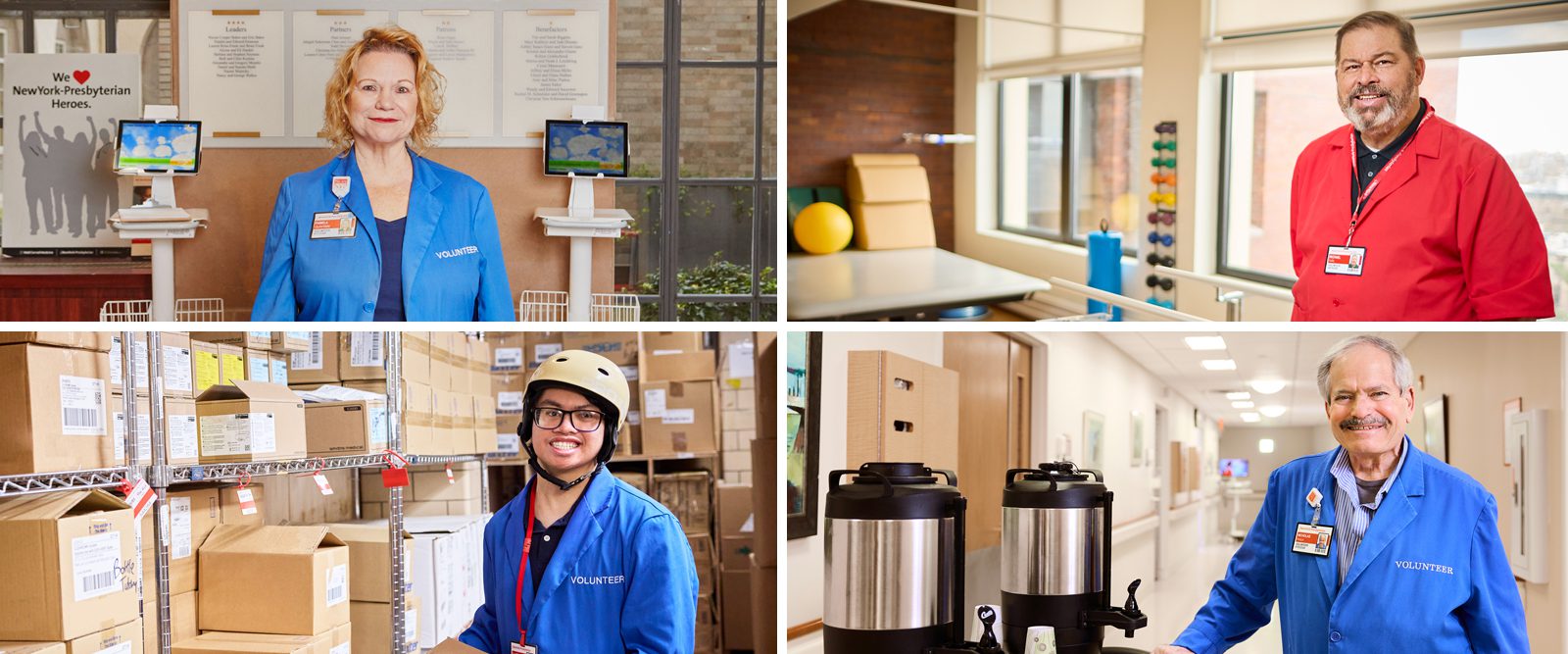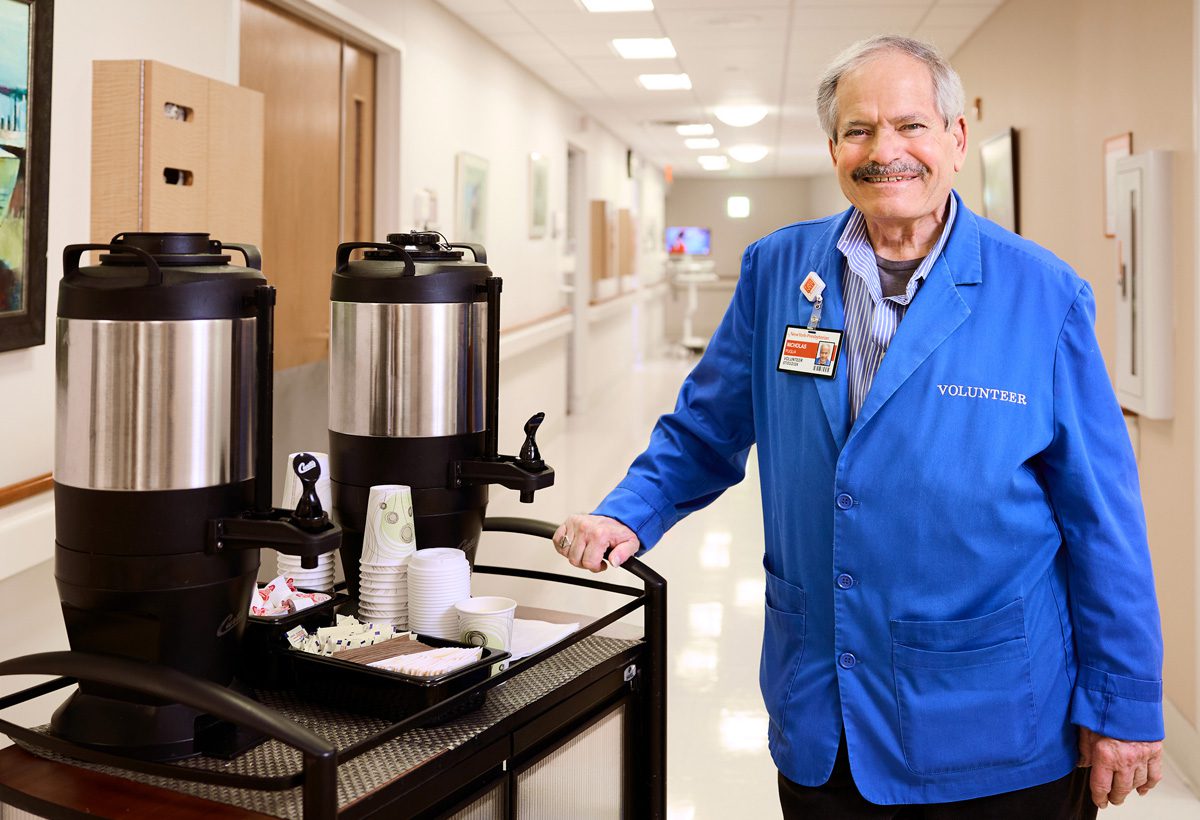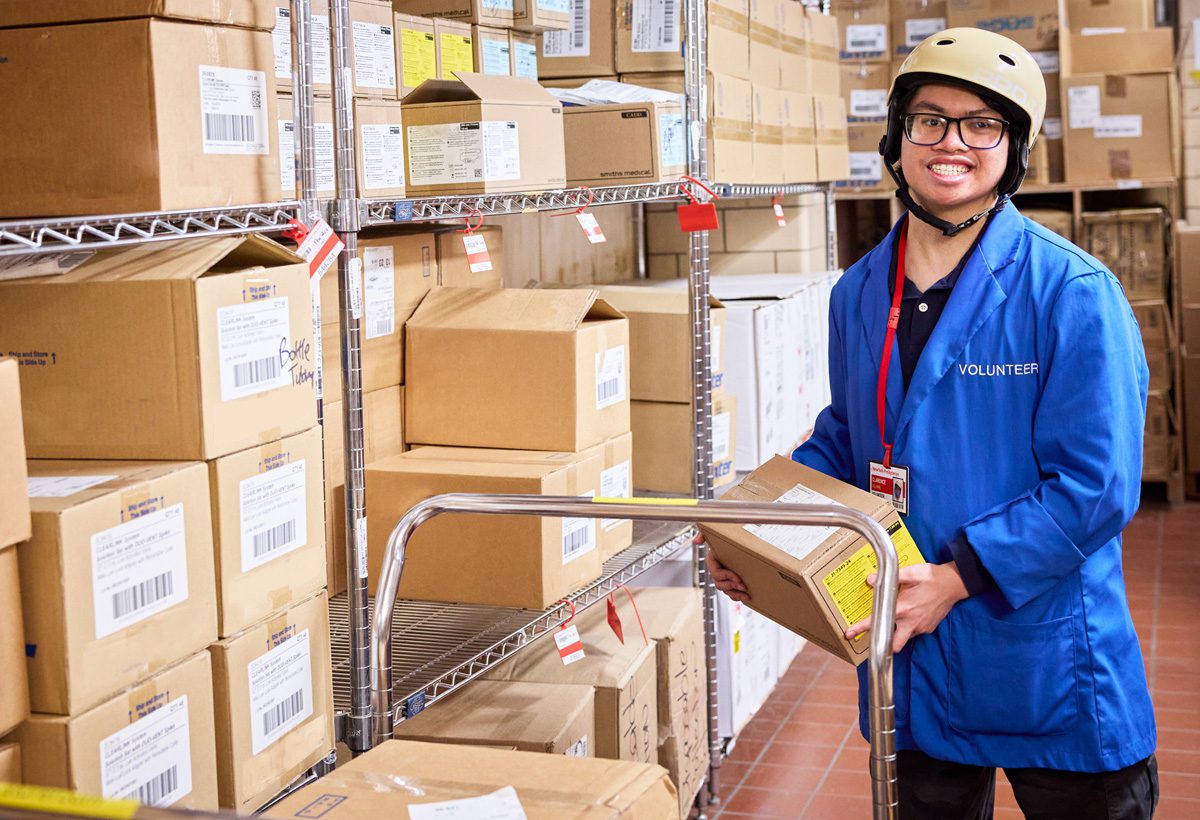Inspired to Give Back: How NewYork-Presbyterian Volunteers Make a Difference
These volunteers selflessly give their time to help patients and families during a hospital stay and have also discovered the many benefits of helping others.

On a busy Wednesday morning at NewYork-Presbyterian/Weill Cornell Medical Center, Pam Clayton approached a couple who was standing in line in the lobby. They were late for a procedure and appeared anxious. “I can help you, don’t worry,” she said. “First you need to sign in at the desk, get a wristband, and I can tell you where to go.” Minutes later, a family who spoke limited English arrived at the hospital to visit a loved one. Clayton took extra care and accompanied them to the right place. When she returned to the lobby, she resumed her job of welcoming the hundreds of New Yorkers who visit the hospital every day.
“Visitors come in the front door, go through security and the next person they see is me,” says Clayton, one of more than 2,400 volunteers across NewYork-Presbyterian. “It feels good to try to help people.”
At NewYork-Presbyterian, volunteers have a variety of responsibilities throughout the hospital — from administrative tasks and patient navigation, to handling therapy dogs and cuddling babies in the NICU. Volunteers are asked to give a minimum of four hours a week for a total of 150 hours to be completed in six months. “Our volunteers are so important in helping us provide the best care for our patients and their families, and there are many opportunities for all ages and backgrounds,” says Evelyn Ramos, corporate director of volunteer and interpreter services at NewYork-Presbyterian.
The Benefits of Volunteering
When Clayton retired from her career in investment banking, she was looking for a volunteer opportunity that was totally opposite from a daily routine of crunching numbers and sitting in front of a computer. “Here it is a hundred percent about interacting with people, and I love that,” says Clayton, who has a weekly, four-hour shift as a greeter. “Before I started volunteering at the hospital, all of my friends were from the financial field, and now I have a new network. I’ve met so many different people.”
Clayton isn’t just helping the hundreds of people who come in through the doors of the hospital — she has reaped benefits from volunteering work as well. She has formed close friendships over her seven years of volunteering, meeting regularly with a group of fellow volunteers for dinner, coffee dates or walks in Central Park. One volunteer is an opera singer, so they started going to the opera. Now she’s trying to organize a pickleball outing.
Social interaction and making friends are among the many reasons experts say volunteering benefits both physical and mental health. One study published in the Journal of Happiness Studies surveyed 70,000 people about volunteering and mental health over an 18-year span and found people who volunteered reported better overall health and were happier.
“When people volunteer, they’re giving freely and generously with no expectation of anything in return, which is really special,” says Dr. Sheau-Yan Ho, a clinical health psychologist at NewYork-Presbyterian/Columbia University Irving Medical Center. “It’s not necessarily in the form of money — it’s your time, your effort or sometimes physical labor. The contribution to a greater purpose or cause cultivates a sense of personal meaning.”
And because volunteering is a natural opportunity to meet people and build community, it is recommended as a way to address the current epidemic of loneliness in a report by the Surgeon General.
From Patient to Cheerleader
For Michael Cairl, the motivation to give back started with the care he received at NewYork-Presbyterian Brooklyn Methodist Hospital. In 2018, Cairl was admitted to the emergency department after suffering a brain stem stroke, which left him unable to walk and weak on his left side. He was transferred to the inpatient rehabilitation program for a six-week stay where he spent hours working to regain his strength and walk again.
“Having a stroke was a transformative experience in so many ways,” he says. “I really valued the treatment I got here. A couple of therapists became close friends of mine, and part of me wanted to work alongside them.”
So last year, Cairl started volunteering at the same physical therapy unit where he recovered. He stops by for three hours a week to visit patients and share his story. He tells patients how he is back working full time, takes the subway, organizes walks around New York City, and advocates for disability rights.
“The people I meet appreciate the encouragement from someone who has been on their side of things,” he says. “It feels great. I often say whatever good I’m doing for them, I’m doing a whole lot better for myself.”
Cairl and Clayton are among the many volunteers who make NewYork-Presbyterian a warmer and more welcoming place. “It takes kind and compassionate people to volunteer in health care,” says Ramos. “Their willingness to share their spare time volunteering says a lot about them as human beings.”

A Coffee Cart and a Friendly Face
Nick Puglia spent his career working as an electrician for over 30 years. After retiring eight years ago, he decided to volunteer at the suggestion of his doctor at NewYork-Presbyterian Hudson Valley Hospital. “He said they usually need people to help around the hospital,” says Puglia.
Now Puglia is a familiar face in the hallways of the third and fourth floors. Three days a week, he makes rounds, visiting patients with a coffee cart in the afternoon. “I come to the room, introduce myself and tell them, “We have a coffee cart for you,” says Puglia, noting he offers coffee, tea, diet ginger ale, bottled water, and graham crackers.
Puglia says patients appreciate the special surprise treat, and he enjoys spending a few minutes chatting with them. Says Puglia, “It means more than I expected to make people feel better.”

Embracing New Opportunities
Whether it’s assisting the housekeeping team, unloading boxes for shipping and receiving, or greeting visitors, Clarence Aguirre is a volunteer with many roles at NewYork-Presbyterian Westchester. Aguirre started working at the hospital through the Project SEARCH program, which provides young people with significant disabilities opportunities to gain real-life employment skills. NewYork-Presbyterian has been working with the program since 2012 and have had over 130 volunteers across three campuses.
Aguirre has come a long way in his own personal journey. Twenty years ago, he and his twin brother were born conjoined at the skull and separated in a rare surgery. The opportunity to volunteer at NewYork-Presbyterian allows Aguirre to make friends, have independence, and learn what it’s like to work in various positions at a hospital. “I was nervous at first, but everything went well,” he says. “Volunteering gives me good experience, office skills, and I get to meet new people.”
Additional Resources
Learn more about how to volunteer at NewYork-Presbyterian.
